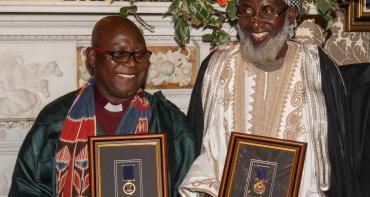Schoolchildren between 7 and 14 years of age from Cyprus, India, New Zealand, Sri Lanka and the UK have been named as winners of the Commonwealth Class Writing Competition, an initiative of the Commonwealth Secretariat and British Council.

Schoolchildren between 7 and 14 years of age from Cyprus, India, New Zealand, Sri Lanka and the UK have been named as winners of the Commonwealth Class Writing Competition, an initiative of the Commonwealth Secretariat and British Council.
The international short story writing competition was themed around ‘Belonging’, with two student categories: a 7–10 year-old class of entrants and a 11–14 year-old class.
First prize in the 7–10 category was awarded to James Balston from Waitakere Primary School, New Zealand, for his imaginative interpretation of 'belonging' through the native animals of New Zealand, a vividly described and wonderfully vibrant story. James will receive a book token worth £100 along with a River of Stories anthology set published by the Commonwealth Education Trust for his school.
Second prize was awarded to Eva Bennet from Churchfields Junior School, United Kingdom, who will receive a £50 book token. She wrote a gracefully paced story of a precious gem subject to many owners over the course of history.
Third prize was awarded to Himayath Nuzraan from The British School in Colombo, Sri Lanka, who receives a £30 book token. Hers was a classic tale of rebellion and belonging, with the author using imaginative and true-to-life dialogue to create a narrative with a satisfying resolution.
An Outstanding Achievement Award was given to Priyadarshini Nag from Modern High School, Kolkata, India, who reflected on the value a street community brings to a neighbourhood.
In the 11–14 year-old category, Ailsa Dixon from the Ellon Academy in the UK won first prize and a £100 book token for her evocative and extremely beautifully written story about finding a sense of belonging that provides an escape from a difficult reality.
Second prize with a £50 book token was Hamsa Madhira from Chirec International School, India, whose story was a tragic tale of family and relationships. Third prize and a £30 book token was won by Aikaterini Niniou from the Junior and Senior School, Cyprus, whose story explores the journey of belonging through a simple, yet compassionate story about an orphan’s experience and adoption.
The competition received over three thousand entries from both schoolchildren and teachers from Commonwealth countries around the world. The winners of the teacher’s category were announced in December last year.
Cortina Butler, director of literature at the British Council and head of the judging panel, commented: “In both age groups there has been a wide ranging and inspiring response to the challenge of writing a story on the theme of belonging.
“We have learned so much from reading everyone’s work about the lives of young people growing up in the Commonwealth – both what is common to us all and what is distinct. What all the entries clearly demonstrate is how important a sense of belonging is to every one of us, wherever we live.”
Emma Kerr, partnerships officer at the Commonwealth Secretariat, which funds the Commonwealth Class initiative, commented: “The aim of Commonwealth Class is to increase understanding of the values and principles of the Commonwealth such as tolerance, respect and understanding. We have been overwhelmed by the quality of the winning entries and expect that they will inspire both children and adults.”
Commonwealth Class is a joint project between the Commonwealth Secretariat and the British Council. It has been running since 2013 and has already reached over 120,000 schools.
The project aims to educate children aged seven to fourteen about the values and principles of the Commonwealth and to increase understanding about the lives of young people in other countries. It encourages students to collaborate and learn together, and consider how they can be more active and responsible global citizens.
All of the winning stories and illustrations as well as those that were highly commended by the judges can be seen on the British Council’s Commonwealth Class website



